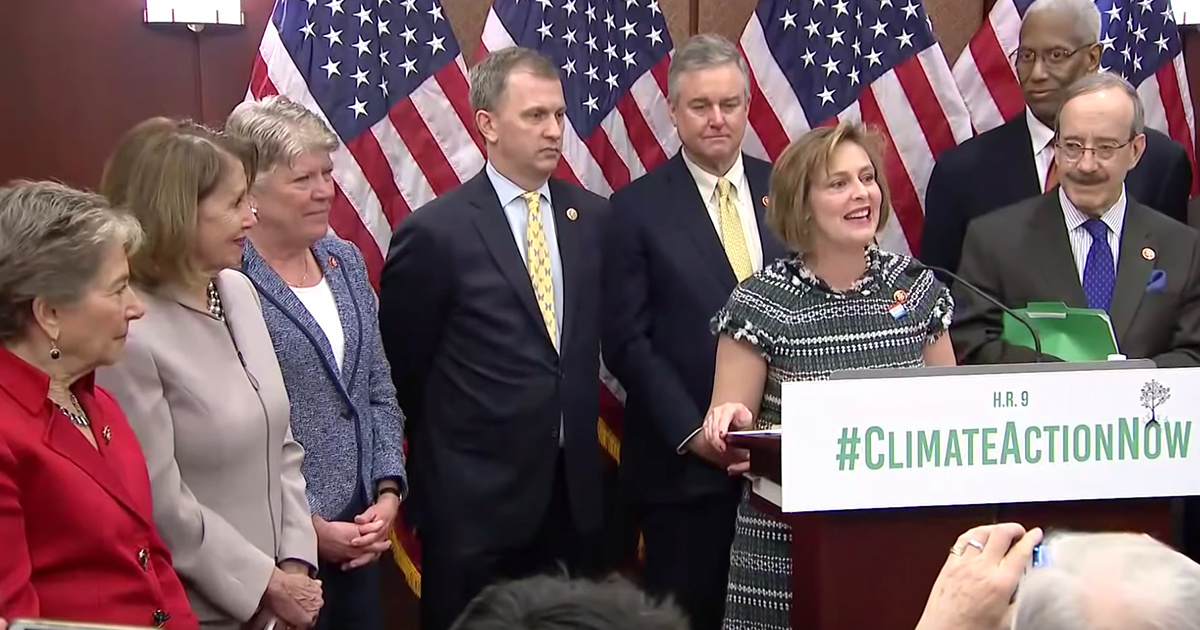
‘Climate Action Now’ Act Is Not Enough to Answer Climate Emergency, Critics Warn

Rep. Kathy Castor, House Speaker Nancy Pelosi and House Democrats introduced the Climate Action Now Act on March 27. NowThis News / YouTube screenshot
By Jessica Corbett
Progressives are urging federal lawmakers to pursue a “real solution” to the climate crisis while House Democrats gear up for a vote this week on a bill to block President Donald Trump from ditching the Paris agreement.
“This action from the House is better than no action at all, but not much better,” Food & Water Watch executive director Wenonah Hauter said in a statement Wednesday. “Given all that’s known about the severity of the climate crisis we face, and the urgent, aggressive action required to stem it, this legislation is merely symbolic.”
The legislation in question, the Climate Action Now Act (H.R. 9), was introduced in late March by Rep. Kathy Castor (D-Fla.).
In June of 2017, Trump vowed to withdraw from the Paris agreement — but he can’t officially take action until November of next year.
H.R. 9 would prevent the president from bailing on the accord — which is backed by every other country on the planet — and require his administration to develop a public plan detailing how the U.S. “will achieve an economy-wide target of reducing its greenhouse gas emissions by 26 to 28 percent below its 2005 level by 2025.”
Although a primary priority of the bill is keeping the country signed on to the agreement that coordinates global efforts to combat the climate crisis, E&E News reported Wednesday that “during a closed-door caucus meeting yesterday ahead of floor action today on H.R. 9, leaders told the rank and file to focus on the economic benefits of climate action and not ‘some international standards.'”
“It’s all about unleashing the clean economy here in America,” said Castor, who chairs the Select Committee on the Climate Crisis. “That agreement would allow countries to create their own goals — America did and it has already created a wave of green jobs.”
The bill’s co-sponsors include Speaker Nancy Pelosi (D-Calif.), who created the climate committee late last year, after Democrats took control the House in the midterms. Some progressives criticized the committee as a “weak” response to mounting demands for ambitious action on the scale of scientists’ warnings about looming climate catastrophe — and they leveled similar criticism at H.R. 9 this week.
“Simply put, it’s the junior varsity bill,” RL Miller, chairman of the California Democratic Party’s environmental caucus and co-founder of the political action committee Climate Hawks Vote, told Bloomberg. “It’s nice but extremely insufficient.”
Bloomberg reported Wednesday that “Pelosi is trying to head off her party’s restive progressive caucus by invoking the legacy of President Barack Obama to build support for a climate change bill that falls well short of the ambitions of the Green New Deal,” a resolution sponsored in the House by Rep. Alexandria Ocasio-Cortez (D-N.Y.).
Ocasio-Cortez told the outlet “there is no harm in passing” H.R. 9, but lawmakers can’t stop there. “The idea that we can just reintroduce 2009 policies is not reflective of action that is necessary for now in the world of today,” she said, reiterating the need for a Green New Deal.
The resolution that Ocasio-Cortez unveiled in February with Sen. Ed Markey (D-Mass.) calls for transitioning the American energy system away from fossil fuels to 100 percent renewable sources over a decade, creating millions of green jobs, and providing for vulnerable communities impacted by the climate crisis.
The Green New Deal, backed by a youth-led grassroots movement, goes beyond the goals of the Paris agreement and more closely aligns with the demands of scientists and climate campaigners.
“The latest science is clear: In order to adequately address deepening climate chaos, we must transition completely to clean, renewable energy generation in little more than a decade,” said Food & Water Watch’s Hauter. “The terms of the Paris accord aren’t low-hanging fruit, they’re fruit that has fallen to the ground and begun to rot.”
The House kicked off debate on H.R. 9 Wednesday, and is expected to pass the bill as early as Thursday. However, the Republican-controlled Senate is unlikely to send the legislation to Trump’s desk — and even if it does, the White House already issued a veto threat.
Despite the bill’s legislative barriers and the Paris agreement’s limitations, as Alden Meyer wrote for the Union of Concerned Scientists Tuesday, the House’s upcoming vote “will provide some hope to international observers that the United States may soon return to the fold of countries committed to climate action.”
But symbolic gestures aren’t enough for Hauter, who called on lawmakers to actually address the problem.
“Any meaningful response from Congress to the climate crisis we face must include a quick halt to new fossil fuel development, including bans on oil and gas exports, and drilling and fracking on federal lands,” she said. “Anything less cannot be considered part of a real solution.”
Reposted with permission from our media associate Common Dreams.

 233k
233k  41k
41k  Subscribe
Subscribe 